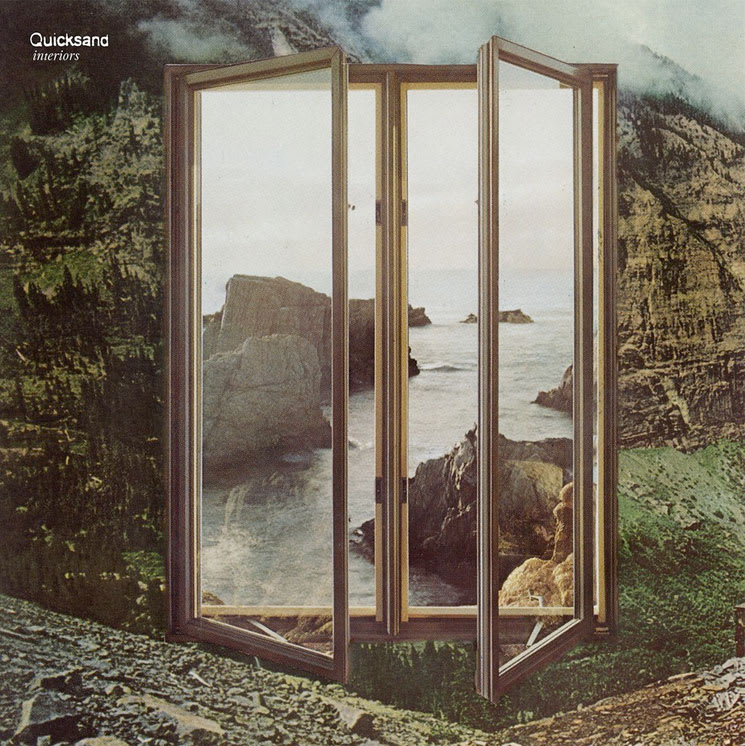Considering the rate at which Walter Schreifels pumps out new albums through his various projects, it sure doesn't feel like it's been 22 years since the last Quicksand album. In the last year alone, the hardcore and post-hardcore hero has released three full-lengths (two with his other current bands, Dead Heavens and Vanishing Life), including this, the long-awaited third album by what is arguably his most celebrated band.
Surviving just five years (between 1990 and 1995), in which they released two albums for Island, and then folding in 1999 after a frustrating attempt to continue, Quicksand were post-hardcore's great lost hope. But a reunion in 2012 that felt like little time had passed, and the fact that all members — bassist Sergio Vega plays bass in Deftones, while Schreifels also has a solo career, Rival Schools and Walking Concert active when he needs them to be — were able to make space in their schedules has now, finally, led to a third album.
Interiors significantly builds on the subtle progression that began with 1995's Manic Compression, signalling that these musicians have gained confidence and chops throughout the last couple of decades. All the musicians here are original members (though it was recorded as a three-piece without guitarist Tom Capone, who has for the time being at least, left the band), and as such, the album opens with three songs that sound like vintage Quicksand, with Vega's low rumbling bass tones and Schreifels' chunky, palm-muted chords coalescing as tightly as they once did.
That tension the band had in the '90s begins to loosen up after that trio of songs, though, and from the first interlude on, a new version of Quicksand emerges, one that seeks to expand the band's sense of melody, space and texture. As a result, tracks like "Cosmonauts" and closer "Normal Love" unlock sides to Quicksand few could have foreseen during their original days. Bringing in Will Yip as producer also makes complete sense; the Philadelphia native has basically built his reputation on grooming Quicksand-alikes, but his contribution on Interiors is as beneficial to the band as it is to him.
A new Quicksand album was never a sure thing, but Interiors feels like a best-case scenario for long-time fans. The odds are always iffy that reunion albums will sustain a band's quality, but you can sense Schreifels, Vega and drummer Alan Cage carefully put in the effort for this one. Interiors can proudly call itself a rightful successor to the post-hardcore classics status of their first two albums.
(Epitaph)Surviving just five years (between 1990 and 1995), in which they released two albums for Island, and then folding in 1999 after a frustrating attempt to continue, Quicksand were post-hardcore's great lost hope. But a reunion in 2012 that felt like little time had passed, and the fact that all members — bassist Sergio Vega plays bass in Deftones, while Schreifels also has a solo career, Rival Schools and Walking Concert active when he needs them to be — were able to make space in their schedules has now, finally, led to a third album.
Interiors significantly builds on the subtle progression that began with 1995's Manic Compression, signalling that these musicians have gained confidence and chops throughout the last couple of decades. All the musicians here are original members (though it was recorded as a three-piece without guitarist Tom Capone, who has for the time being at least, left the band), and as such, the album opens with three songs that sound like vintage Quicksand, with Vega's low rumbling bass tones and Schreifels' chunky, palm-muted chords coalescing as tightly as they once did.
That tension the band had in the '90s begins to loosen up after that trio of songs, though, and from the first interlude on, a new version of Quicksand emerges, one that seeks to expand the band's sense of melody, space and texture. As a result, tracks like "Cosmonauts" and closer "Normal Love" unlock sides to Quicksand few could have foreseen during their original days. Bringing in Will Yip as producer also makes complete sense; the Philadelphia native has basically built his reputation on grooming Quicksand-alikes, but his contribution on Interiors is as beneficial to the band as it is to him.
A new Quicksand album was never a sure thing, but Interiors feels like a best-case scenario for long-time fans. The odds are always iffy that reunion albums will sustain a band's quality, but you can sense Schreifels, Vega and drummer Alan Cage carefully put in the effort for this one. Interiors can proudly call itself a rightful successor to the post-hardcore classics status of their first two albums.
